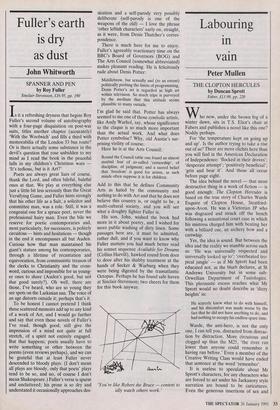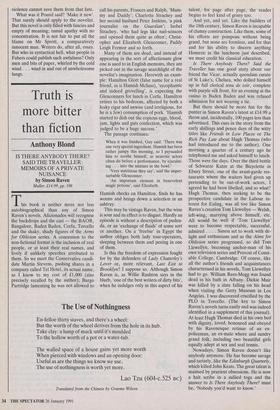Labouring in vain
Peter Mullen
THE CLOPTON HERCULES by Duncan Sprott
Faber, £13.99, pp. 220
Who now, under the brown fog of a winter dawn, sits in T.S. Eliot's chair at Fabers and publishes a novel like this one? Noddy perhaps.
For 'the temperature kept on going up and up'. Is the author trying to take a rise out of us? There are more cliches here than you will find in the American Declaration of Independence: 'flocked in their droves'; `desperate attempt'; 'positively beneficial'; `grin and bear it'. And those all occur before page eight.
The idea behind the novel — that most destructive thing in a work of fiction — is good enough: The Clopton Hercules is based on the true story of Charles Warde Esquire of Clopton House, Stratford- upon-Avon. He was a Victorian JP who was disgraced and struck off the bench following a sensational court case in which his mistress charged him with beating her with a billiard cue, an archery bow and a cartwhip.
Yes, the idea is sound. But between the idea and the reality we stumble across such as: 'He was universally respected and universally looked up to'; 'overheated tro- pical jungle' — as if Mr Sprott had been educated not, as the blurb declares, at St Andrews University but in some sub- Orwellian Department of Tautologies. This pleonastic excess reaches what Mr Sprott would no doubt describe as 'dizzy heights' in:
He scarcely knew what to do with himself, and his discomfort was made worse by the fact that he did not have anything to do, and had nothing to occupy his endless spare time.
Warde, the anti-hero, is not the only one, I can tell you, distracted from distrac- tion by distraction. More circuitous and clogged up than the M25, 'the river ran lower than anyone could remember it having run before.' Even a member of the Creative Writing Class would have ended that sentence at the word 'remember'.
It is useless to speculate about Mr Sprott's characters, for any characters who are forced to act under his Jackanory style narration are bound to be caricatures. Even the generous insertions of sex and violence cannot save them from that fate.
What was it Pound said? 'Make it new'. That surely should apply to the novelist. But this novel is only filled with fancies and empty of meaning; tumid apathy with no concentration. It is not fair to put all the blame on Mr Sprott, a comparatively innocent man. Writers do, after all, essay. But who in syntactical hell, what people in Fabers could publish such awfulness? Only men and bits of paper, whirled by the cold wind . . . wind in and out of unwholesome lungs.



























































 Previous page
Previous page